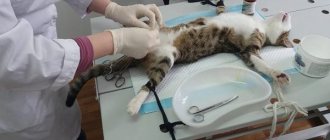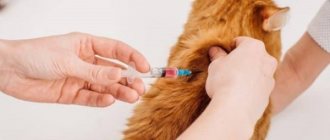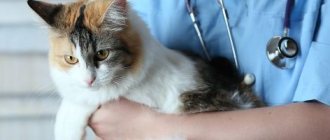May 19, 2020
Castration is a surgical procedure during which a veterinarian removes the testes from a cat. However, this procedure can be performed without surgery.
To understand all the intricacies, you need to learn more about the types of procedures and methods of implementation.
Should a cat be neutered? Pros and cons of the operation
Pet owners think about the sterilization procedure after young cats begin to mark their territory. The main advantage of castration is the disappearance of the desire to mate. However, the operation has many other advantages:
- Elimination of aggressive, restless behavior. The testes produce special hormones that force the cat to look for females and defend its territory from strangers. Even if the animal lives in an apartment and has never seen other cats, the owners may notice the pet’s constant anxiety. If two males meet in the same territory, fights will begin. Excessive testosterone production can lead to the cat attacking its owners.
- Prevention of diseases. After castration, a cat will not develop a testicular tumor, since this organ will be completely removed.
- Reducing the risk of the animal running away. Even if a cat is very attached to its owners, the natural instinct of reproduction can take precedence over reason. The animal will try to escape every time it smells a female. Domestic cats are poorly adapted to outdoor life. After castration, the animal is unlikely to want to leave a comfortable and safe place.
- Elimination of unpleasant odors. Kittens' urine does not have a strong odor. During a cat's puberty, a special secretion is mixed into the urine. Hormones force the male to “mark” his territory and attract females. People find this scent very unpleasant. After castration, the cat's urine will not have a strong odor. The pet will only go to the litter box and not mark any surfaces in the house.
- Increased life expectancy. According to worldwide statistics, neutered pets live longer. They do not experience stress from heat. This makes their nervous system calmer.
Castration, like any other surgical operation, has its drawbacks. It has been proven that castrated cats become passive. Lack of activity leads to obesity, which in turn contributes to the development of diabetes, urocystitis and urolithiasis, and also provokes joint problems.
Fortunately, most unpleasant complications can be prevented by providing the animal with proper nutrition. In any case, the benefits of castration outweigh any possible disadvantages. The main thing is to entrust the health of the animal to an experienced veterinarian.
From 2-5 years
It happens that a cat ends up with its owners as an adult. If there are no contraindications, cats can be neutered at this age. You shouldn't expect much effect from the manipulation. The cat's body developed under the influence of sex hormones.
Castration of an adult pet will not solve problems with marking the premises with urine, attempts to escape from the house and regular howling. Unfortunately, it is almost impossible to correct the habits and behavior of an older cat.
The disadvantages outweigh the benefits of the intervention
- Risk of physical inactivity.
- Gaining excess weight. Corrected by a specially selected diet
The operation is performed only under general anesthesia.
When should a cat be neutered?
There are no strict deadlines for castration of cats. Most specialists do not perform surgery on kittens under four months of age. Optimal time for surgery: 6-9 months.
Castration of a cat at an early age
Veterinarians do not recommend sterilization for cats under six months of age. But if the cat shows signs of sexual activity earlier, then castration will be carried out immediately after the animal reaches five months of age.
Surgeries at an early age will not affect weight loss or skeletal underdevelopment. These features are laid down in the genotype, which determines the constitution of the pet.
Carrying out surgery at the age of 7-9 months
It has been proven that cats that have reached the age of 6-9 months tolerate castration best. The animal enters adolescence and begins to show interest in females. The cat may start meowing throughout the day. It is at this age that a pet experiences a hormonal surge, which is negatively reflected in the smell of urine.
The cat also gains sufficient body weight to tolerate anesthesia normally. Some veterinarians advise bringing your cat for surgery long before physiological changes develop.
Carrying out surgery in adulthood
Young cats under 3 years of age tolerate castration quite well. However, it is worth considering that adult males who are already accustomed to marking territory can continue to do so even after castration. It will take at least a month to level out your hormonal levels.
About 5% of animals will continue to mark territory for the rest of their lives. Also, some castrated “untied” cats may try to have sexual intercourse with a female. Veterinarians consider this behavior to be a habit: the cat is simply repeating already established patterns.
Technically, cats over 3 years old can also be neutered. However, in adult animals the risks of anesthesia increase. Such an animal must first be examined: undergo blood tests and undergo a screening ultrasound of the heart.
Optimal age of castration
An operation to suppress the sexual function of a cat will only be effective if the castration age has been selected correctly. By the following signs you can understand that the pet is ready for this procedure:
- Puberty has recently begun. Breeders and veterinarians believe that it is necessary to castrate a pet that has not yet been mated. Otherwise, there will be no effect from the operation: the desire to mate will remain.
- The cat's body has finally formed. Felinologists believe that castration slows down growth. Therefore, it is better to perform the operation when the pet is fully formed.
- The testes have descended from the abdominal cavity or inguinal ring. Until this point, the operation cannot be performed. Doctors recommend carrying out the procedure 2–3 months after prolapse.
You can castrate a cat from 6 months. The latest age for surgery is not clearly defined. Some do this at 2 years old, others at 4 years old. Most owners castrate cats before they are one year old.
It is also important to take into account the breed of your pet. For example, it is easier for representatives of large breeds to tolerate anesthesia, and they are castrated when their body weight reaches 2 kg.
Important! It is better to neuter both a purebred Scotsman and an ordinary yard cat at the age of 8–12 months. It is during this period that the body is already fully formed and ready for the administration of anesthesia.
Owners of cats must carefully select the age for the operation. It is important to be guided not only by your own desires, but also by the needs of your pet. Properly planned castration will not harm the cat’s health and will make life easier for the owners.
Preparing a cat for castration
The most important rule for the owner: remain calm throughout the entire period of preparation for the operation. Pets understand human emotions very well. The pet will feel anxious and begin to hide and behave aggressively. It is necessary to maintain a fasting diet for 6-8 hours before anesthesia. Water can and even should be left available.
If castration will be carried out by a veterinarian who has not previously examined the cat, it is necessary to prepare information about vaccinations, medications and diseases that the animal has suffered. The owner will also be asked to sign a consent form for the use of anesthesia, an information sheet regarding possible complications after the operation.
How to properly prepare your pet for surgery?
Since at two years old the animal can rightfully be considered an adult, it should be kept on a completely starved diet for at least 10 hours. No “light snacks”! Your pity for a hungry cat may well cause his death from aspiration of the respiratory tract and/or aspiration pneumonia subsequently.
It's all about the peculiarities of the innervation of internal organs during anesthesia. If semi-digested food masses remain in the gastrointestinal tract, they can rise, causing the cat to risk choking on vomit.
The restrictions on drinking are not so strict, but they still exist. Thus, it is not recommended to give water to the animal less than three hours before surgery. Even if the cat is thirsty, it is guaranteed that liquid, “generously” flavored with leftover food and digestive enzymes, will not enter its lungs. This leads to severe pneumonia in 100% of cases.
Anesthesia for castration of a cat
To choose the optimal method of pain relief, the veterinarian will examine the cat and take measurements of vital signs:
- temperature;
- heart rate;
- blood pressure.
The veterinarian will perform surgery only if he receives confirmation that the cat is healthy enough to recover from anesthesia.
Most often, the animal is sedated using an injection. An intravenous catheter is inserted through the shaved area of the paw.
Inhalation anesthesia
Most cats are given anesthetics by injection or intravenous catheter. After falling into a light sleep, the anesthesiologist will insert an endotracheal tube through which anesthetic gas will be administered.
The animal will also be connected to equipment that monitors heart rate, breathing, and blood pressure. Most veterinary clinics use an inhaled drug - isoflurane or sevoflurane.
Non-inhalational anesthesia
The most common type of sedation and analgesia is a combination of drugs. The operation to remove the testes is quite simple and takes approximately 10-15 minutes.
Most often, this manipulation uses a combination of a sedative intravenous drug and a local anesthetic, which is injected directly into the testes themselves for pain relief.
A little about castration
In cats, puberty occurs quite early. At 4-5 months, the kitten has not yet lost its milk teeth, but it can already fertilize the female. A more correct term is castration, since sterilization implies the elimination of the ability to reproduce, but with the preservation of sexual activity. Castration is the complete removal of the testes from the scrotum.
Before the operation, the animal is given general anesthesia and local anesthesia, after which it is attached to the operating table. The hair at the site of the intervention is shaved and the surgical field is disinfected.
After preparation, the surgeon dissects the scrotum to avoid bleeding, ties the vessels leading to the testes, after which they are cut off. The scrotal cavity is treated with antiseptics, and the wound is sutured. The duration of the procedure ranges from 30 minutes to an hour.
Methods of castration of cats
There are several options for sterilizing males. In modern veterinary clinics, testes are most often removed surgically. However, some systemic diseases may make any intervention impossible.
Nuances of classical surgery
After administering anesthesia, the surgeon will make two incisions directly on the animal's scrotum. Next, the specialist removes the testes, placing biological nodes on the blood vessels. The incisions are treated with an antiseptic solution. Sutures, as a rule, are not applied.
Medical (chemical) castration
If anesthesia or sedation is contraindicated, your veterinarian may administer medications to stop testosterone production. The advantages of this method include reversibility and low risk of complications.
Chemical castration involves inserting an implant under the cat's skin. The testes gradually atrophy, that is, decrease in size. The animal's behavior will change within 4-5 weeks after the procedure. The duration of the effect varies from 6 to 12 months.
After the end of the implant, the production of hormones is restored, which also leads to the return of the size of the testes and the manifestation of sexual desire.
Features of castration of a cryptorchid cat
If one or two testes do not descend into the scrotum, the cat is diagnosed with cryptorchidism. The shedding process must be completed before the kitten is 6 months old.
The nuances of the operation directly depend on the location of the testes. They may be located under the skin or in the abdominal cavity. If one or both sex glands remain in the abdominal cavity, then to perform the removal procedure, abdominal surgery is performed through one incision.
Early and late castration
Veterinarians usually recommend castrating kittens at the age of no earlier than 7-8 months, when the body is almost physiologically formed. If the owners have enough patience, it is not harmful to wait until a year, when all the body systems have finally matured. However, sometimes you can find information that early castration of cats does not harm the body. Let's figure out what's what.
Early castration - rush for no reason
Castration of kittens aged 2 to 5 months has become common in our country not so long ago. And many baby owners are very happy with this opportunity: they will never have to find out what cat marks smell like, because the operation is done at too early an age.
The opinions of experts differ diametrically. Some argue that there is no danger either during surgery or in the future. Others say that kittens need time to grow and mature.
The arguments of supporters of early castration are as follows:
• When the testes are removed up to 4-5 months, no narrowing of the urethra is observed. And this has long been considered the main reason for refusing early castration. Research has shown the opposite.
• For a long time it was believed that early castrati become underdeveloped and have problems with the musculoskeletal system. Studies have shown that early castrati often become larger than their peers.
Opponents of early castration argue the harm from the operation as follows:
• A tiny kitten weighs so little that it is extremely difficult to calculate the dose of anesthesia that is necessary and safe for it, and an “overdose” is fraught with the death of the animal or complications upon exit. In general, general anesthesia is given to kittens only in extreme cases - if there is a threat to life.
• There are no convincing scientific studies with statistical data on the effect of early neutering on the behavior of such young kittens. It is impossible to predict how castration will affect the psyche of a particular kitten. However, some lethargy is often observed after a year of life, especially if the pet has never been outside.
• Early neutered kittens become taller than their peers. But there is nothing to rejoice about here, since it is known that early castration slows down the formation of the skeleton. When in uncastrated individuals the skeleton is already fully formed, in early castrates it is still growing, elongating in length. But bone material in the body is not added with castration; there will be as much of it as is genetically determined. The skeleton stretches and thins, becoming more fragile. Loose bone tissue is more susceptible to fractures and other injuries.
• Many kittens are born cryptorchid, their testicles are not descended into the scrotum and are located in the abdominal cavity (this deviation often goes away with age). Early castration of cryptorchids is an abdominal operation with opening of the abdominal cavity; needless to say, this is more complicated, and the postoperative period will become longer and more difficult.
• Children's immunity is still weak, and besides, early age is the time for vaccinations. At this time, surgery is an extra burden on the immune system.
• A direct connection between early castration and the subsequent development of urolithiasis has not been identified. But the studies lasted a maximum of 3 years, while urolithiasis manifests itself at 7-8 years, so such observations are insufficient. At the same time, it is reliably known that after castration the animal becomes lethargic and prone to obesity, and these are the main predisposing factors.
Late castration and age-related problems
If the cat is already elderly, then veterinarians, as a rule, do not recommend “disturbing” his worn-out body by castration. In old age, castration is usually carried out for medical reasons - uncontrolled aggression, urinary incontinence, prostate hyperplasia, testicular cancer.
Important! Old cats are rarely completely healthy. Stress associated with the operation, general anesthesia, stress on the body due to hormonal changes - all this can aggravate existing chronic diseases.
Renal and heart failure are contraindications for surgery. Due to a drop in blood pressure, the kidneys may not be able to do their job. Anesthesia slows down the work of the heart, so if there is insufficiency, acute cardiovascular failure can occur.
Even if the operation was successful, in the future the old cat and its owner may encounter the following complications:
• An elderly body does not heal its wounds well. Long healing of wounds increases the risk of infection and inflammation, bleeding, and suture dehiscence.
• The likelihood of urethral blockage and the development of urolithiasis may increase.
• A common complication after castration of older cats is constipation, as anesthesia relaxes the smooth muscles of the intestines, and recovery is slow due to age.
• There is a risk of developing hernias, since old tissues are flabby and prone to cellular proliferation and loss.
We should not forget that purebred cats often have a predisposition to certain diseases that pose a danger in case of castration. Thus, Persians, Siamese, and Maine Coons are prone to diseases of the cardiovascular system (including hypertrophic and dilated cardiomyopathy in middle and old age). Himalayans, Persians, and shorthaired exotics often suffer from polycystic kidney disease.
The general immunity of pedigree cats is reduced. Therefore, it is necessary to know what specific diseases your elderly “aristocrat” is prone to. But for everyone - both for the breed and for the domestic “old men” - one thing is true: before castration, every “honored veteran” must undergo a comprehensive medical examination and pass all possible tests!
Possible complications after surgery
Surgical removal of the testes is a fairly simple operation, but in rare cases complications can occur. Veterinarians usually assess the animal’s health before the procedure begins and inform the owner about the possible development of the following side effects:
- licking of incisions on the scrotum and inflammation of wounds
- deterioration of general condition
In order to prevent the development of complications, it is necessary to monitor the cat during the first 24 hours after surgery and follow the recommendations of the veterinarian.
Where is the best place to have surgery?
Before castration, a veterinarian examines a cat
Since castration of a cat does not cause serious concerns , it can be done both at home and in a veterinary clinic in a hospital. In any case, you need to listen to the opinion of a specialist.
If the veterinarian is against performing the operation at home, you should not object and insist on your opinion. A home environment is more comfortable for an animal, but in a hospital it will receive qualified care using the necessary medical equipment.
How to care for a cat after castration
After the operation, the doctor will give individual recommendations based on the animal’s condition. However, the standard set of care instructions is approximately the same.
- Provide constant supervision to your pet. If the operation is successful, full recovery of health will take only 1-2 days. It is advisable to keep an eye on the cat until complete rehabilitation. It is important to exude confidence and remember to pet and encourage your pet.
- Place a protective collar around the cat's neck. It is very important to ensure that the cat does not lick the incision area. An Elizabethan collar will prevent the animal from licking the damaged area. Treatment of wounds is usually not required.
- Provide the animal with water and food. You can feed him wet food after surgery, since the cat was previously on a starvation diet. To get him interested in food, it is best to give him a bag of wet food or canned food for neutered cats. This will quickly replenish the balance of micro and macroelements.
Who needs it
It is often said that if an animal is on its own, then there are no problems for the owners. The cat looks for his own adventures, fights for females, and realizes his sexual instinct. Sometimes he dies in fights, plus he actively contacts other animals, risking contracting infections. If he sits at home, then serenades cannot be avoided. And don’t think that the cat will sing only in the spring. But this is not the most unpleasant thing. Much worse are the marks that mature animals use to mark their territory. They have an appropriate smell and are very difficult to remove. It is simply impossible to predict the location that will be attacked. Non-neutered cats are equally successful at marking sofas, the owner's shoes, and corners of rooms.
Possible complications from anesthesia
Any operation has a certain degree of danger. This is not due to the surgical intervention itself, but to the effect of anesthesia, which is by no means harmless.
The consequences of general anesthesia can be as follows:
- Stopping breathing. During anesthesia, an animal's breathing slows down; usually the pet experiences this normally, since all body functions are inhibited. However, in case of an overdose, pulmonary activity can completely stop, and this is fraught with death. The problem is eliminated with the help of ventilation of the lungs and the supply of pure oxygen, and heparin is also administered intravenously.
- Heart problems . Arrhythmias, failure, tachycardia and other complications are possible. All this can lead to pulmonary edema, a drop in blood pressure, or even cardiac arrest. The pathology is eliminated with the introduction of beta-blockers; to control the pet’s condition, it is connected to an ECG machine.
- Drop in blood pressure and organ failure . It is observed in case of heart problems or an overdose of anesthesia. The sudden development of severe hypotension leads to failure of many systems and organs (kidneys, liver), since they need a certain level of pressure to function. The problem is eliminated with the help of an injection of polyglucin or ephedrine with dopamine.
- Anaphylactic shock . It manifests itself in the form of a sharp drop in blood pressure and pulmonary edema. Anaphylactic shock is possible with the introduction of any new drug, so anesthesia is no exception here. Shock is relieved with antiallergic drugs (prednisolone).
- Chills . Since the brain is responsible for temperature changes, the activity of which is inhibited during anesthesia, a violation of thermoregulation often becomes a side effect. Pathology rarely leads to any serious consequences. To warm your pet, you can inject magnesium sulfate intravenously or place the animal on a regular heating pad.
- Pulmonary edema . Appears with heart failure or an overdose of anesthesia. It often does not develop immediately, but after surgery, sometimes even on 2-3 days, when the pet is taken home. Manifests itself in the form of heavy breathing, cyanosis of the mucous membranes, sputum with foam. They are treated with pulmonary ventilation and sulfocamphocaine is administered intravenously.
- Brain swelling . Develops with an overdose of anesthesia or heart failure. Symptoms include a variety of neurological disorders: convulsions, paralysis, agitation, and impaired thermoregulation. The leading symptom is tension and contraction of the muscles of the back of the head, which causes the animal's head to fall back. Therapy consists of surgical reduction of intracranial pressure, as well as intravenous injection of glucocorticosteroids.
What is removed from a cat?
Unlike cats, castration (sterilization) of a cat is a full-fledged abdominal operation: either the ovaries (oophorectomy) or the ovaries and uterus (ovariohysterectomy) are removed.
It is preferable to remove the uterus along with the ovaries, which produce sex hormones, in order to reduce the risk of cancer and purulent diseases in it. Recently, some clinics have begun to use the “laparoscopic” method of cat castration: using a special manipulator, instead of an incision, a lateral puncture is made, through which the uterus and ovaries are completely removed.
Postoperative care
After castration, cats do not need stitches; the wound (usually treated with Terramycin or Alusprey) requires virtually no care. The recovery period for the animal after anesthesia is important (usually up to 24 hours). You should ensure that the cat does not climb onto a chair, bed, window sill or other high place to prevent the possibility of falling.
During recovery from anesthesia, the animal does not control the process of urination, so it is advisable to put a diaper on it. Isolated episodes of vomiting are also possible.
You need to start feeding in small portions in several doses 12 hours (24 hours for a cat) after surgery.
After general anesthesia, there may be no bowel movements for up to 2-3 days. If defecation is delayed for a longer period, you can give the animal Vaseline oil.
To protect the postoperative sutures, a blanket is put on the cat, which does not allow her to remove them with her rough tongue. The blanket also limits the cat's movements, preventing her from moving too actively in the postoperative period. You need to wear it until the stitches are removed (or until they dissolve) and until the wound is completely healed (10-14 days). You must see the cat’s joy when the hated blanket is finally removed from it!
Sometimes, after sterilization, a cat is prescribed a course of antibiotics (2-3 injections) and a 1-2 postoperative examination by a doctor.
If you are concerned about the condition of the animal (weakness, sleepiness, lack of appetite, no urine or stool persist for several days) - do not hesitate, consult a doctor! Surgery under general anesthesia is a serious stress for the body, so exacerbation of chronic and indolent diseases is possible, complicating the tolerance of anesthesia.
So what remains?
If you do not want to harm your animal and put its health at risk, the best solution in this situation would be sterilization (castration) - surgical removal of the gonads.
The first reaction of any owner to this “terrible” word is PITY!
Ooh! But this needs to be dealt with. What exactly is a pity? Do you feel sorry for the cat during surgery? But the operation is performed under general anesthesia, and the animal will not experience pain. Do you feel sorry for two tiny testes in a cat or an ovary and a uterus in a cat? But, if you do not intend to implement their functions, then they are not so necessary. Your pussy will do just fine without them. Moreover, she will be happy without them!
Stopping the hormonal attack on the body has a positive effect on animals both psychologically and physically. After surgery, animals often become calm and balanced, maintaining a playful and calm character until an advanced age. It has been proven that neutered animals live longer and healthier lives! For them, the risk of neoplasms, inflammation of the uterus, etc., as well as the risk of contracting infectious diseases, is reduced.
And how pleased the owner is! Neutered animals rarely run away and do not jump out of windows in search of a partner. They will no longer ask to go outside and organize cat concerts and put scent marks.
And just from personal experience: a cat before and after surgery are literally two different animals. And the owners, for some reason resisting the idea of castration, still sooner or later come to this decision.
Please come early and live happily ever after with your pet!
So, we have sorted out the main question: Castrate? Maybe not? The answer is clear: It is necessary, Vasya, it is necessary!
What to do?
Try to find a soul mate for your pet? Well, if you are not hampered by worries about organizing “dates” and having offspring, this is possible. But... But it won’t solve the problem at all. The cat will be ready for prolongation in just three months. During her entire life, she is capable of giving birth to more than 200 kittens (and for outbred kittens it is quite difficult to find a new home and good hands). Well, the cat has a “political credo “Always!” The month of March stretches over the whole year.
And then various drugs are used. There are harmless sedatives, herbal tinctures (“Cat Bayun”, “Knitting-minus”, “Stop-stress”). They help to dull the severity of anxiety, but at high hormonal levels they are powerless. And then what? Then it begins
Horror 6 USE OF CHEMICAL CONTRACEPTIVES (“Contrasex”, “Stop-intim”, “Sex-barrier”, etc.) There is also a “hormonal injection” to suppress sexual desire in cats (Covinan, Depo-Provera), which has a longer-lasting effect (2-6 months). Read more about hormonal injections here.
But any “anti-sex” given to an animal will only delay its “concerts” for a while. As soon as the action ends, the cat starts screaming in a bad voice again. All these chemicals, while bringing temporary(!) relief, disrupt the hormonal status of the animal, which subsequently leads to the development of pathologies such as ovarian cysts, glandular hyperplasia of the uterus, tumors of the uterus and mammary glands, and there are also frequent cases of hydrometra or pyometra.
Veterinarians often hear complaints from cat owners that the “medicine” used to help, but now it “doesn’t work.” During surgery in such animals, certain structural changes in the ovaries and uterus (cysts, tumor formations) are almost always detected.
And this is the real horror :
The use of contraceptives can lead to disruption of the endocrine system, provoke cancer, and contribute to the development of diseases that are dangerous to the health and even the life of a pet!
Any veterinarian will confirm this irrefutable fact.
As proof, here are a few scary pictures from veterinary surgery:
Horror, so many horrors!











